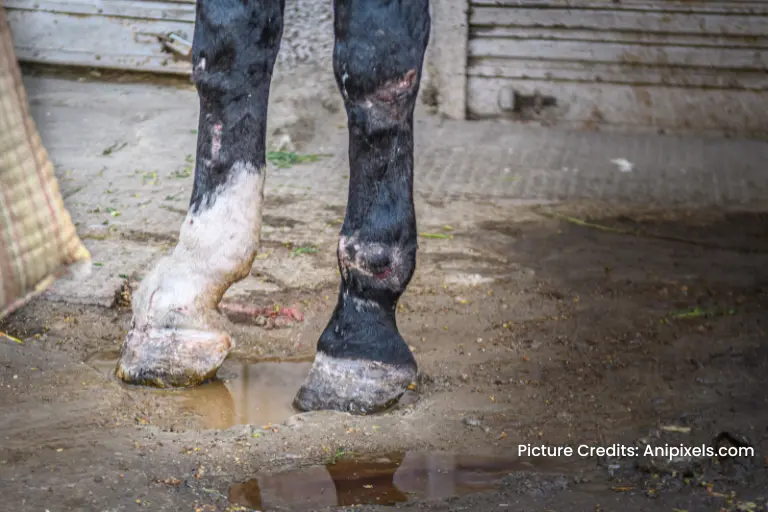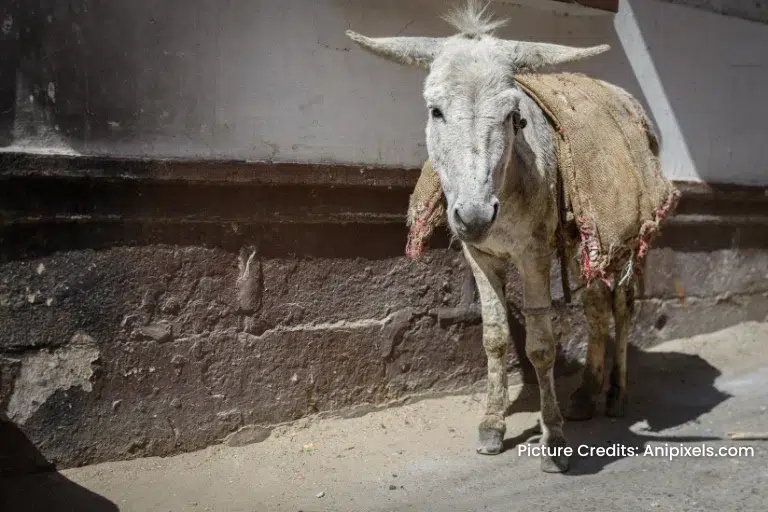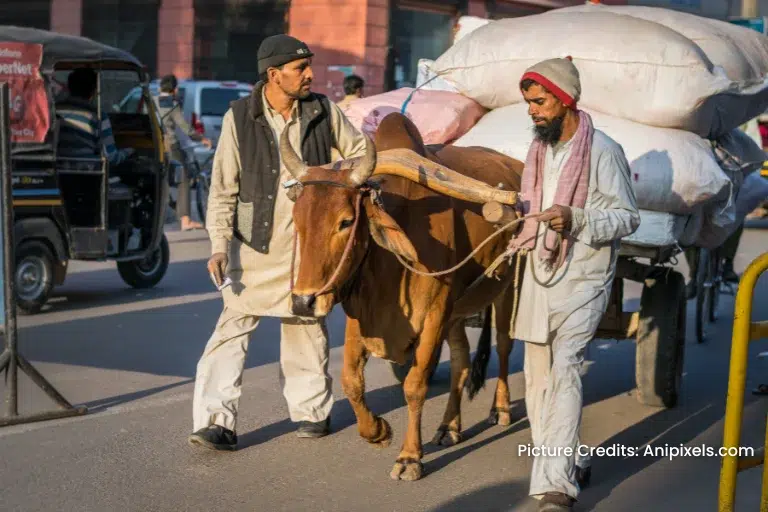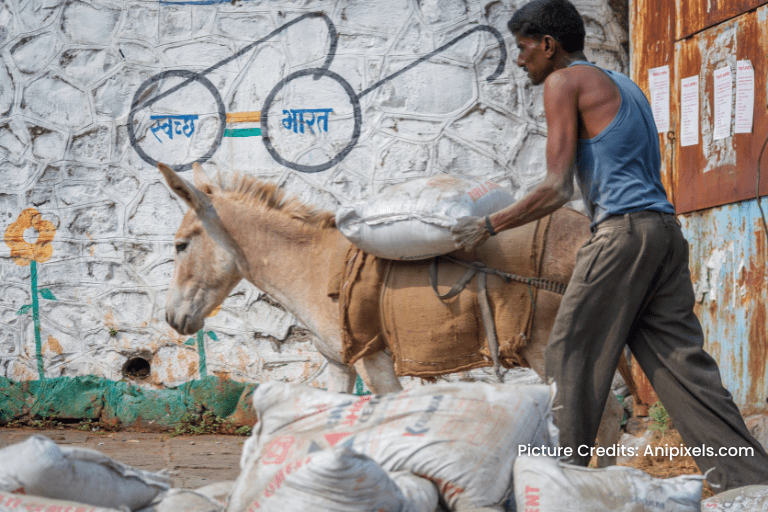
Unsung Heroes on Hooves and Humps: India's Working Animals Deserve Dignity, Not Drudgery
By Heer Shukla
Beyond the idyllic postcards and vibrant tourism brochures lies a stark reality for the very creatures that fuel the rural pulse of India – its working animals. While 70% of rural households rely on these beasts of burden for their livelihood, their daily lives paint a stark contrast to the romanticised images.
Shocking figures reveal an unknown side of misery due to malnutrition and veterinary care crisis:
According to a 2021 report by the Animal Welfare Board of India, 70% of working animals in India are subjected to working hours exceeding their physical capacity. A 2020 study published in the Journal of Veterinary Science and Animal Husbandry found that a significant portion of working animals suffer from calcium and Vitamin D deficiencies, leading to skeletal problems and muscle weakness, struggle with inadequate nutrition. Poor diet often leads to stunted growth, weakened immune systems, and chronic health problems. 60% of working animals receive no veterinary care, they are simply abandoned on the street or sold for slaughter.

World Animal Protection revealed that many working animals, particularly donkeys and horses, are forced to work for 12-16 hours per day, often under extreme weather conditions. Extended hours under the scorching sun, heavy loads exceeding their capacities, and the sting of whips are not uncommon. Often these animals in India are forced to endure work hours beyond their physical capabilities.
This stark reality extends beyond individual suffering:
Decreased productivity: Malnourished and overworked animals become less efficient, impacting the livelihoods of those who depend on them. Imagine a farmer struggling to meet his quota due to a weakened bullock struggling to plough his land.
Increased risk of accidents: Untreated injuries and weakened bodies make these animals susceptible to accidents, jeopardising both their lives and the safety of humans around them. Imagine a horse, blinded by untreated cataracts, causing a cart to overturn, potentially injuring its handler.
Public health concerns: Poor living conditions and lack of hygiene can lead to the spread of zoonotic diseases, posing a threat to both animal and human health. Imagine a village grappling with an outbreak of rabies transmitted by stray dogs with no access to vaccination.
Statistics on Working Animals in India:
- 80 million: Estimated number of working animals in India
- 70%: Percentage of rural households reliant on working animals for their livelihood
- 1-2 million: Estimated number of working animals suffering from malnutrition
- 30%: Percentage of working animals lacking access to basic veterinary care
- 50-70%: Estimated prevalence of overloading and overwork among working animals
(Source: Livestock Census –AHS, DADHs Basic Animal Husbandry Statistics 2024, WAP field study 2022, AWBI 2022 Report, Wildlife SOS 2023 study)
These are not mere statistics; they are stories of silent suffering, stories that must be heard and addressed. In the pursuit of insightful examination, we can pave the way for a future where these indispensable partners in progress are treated with the respect and care they deserve.

While the Prevention of Cruelty to Animals Act, 1960, stands as a beacon of hope, its enforcement remains a distant dream. Though the framework offers protection, its limited enforcement leaves a critical gap in safeguarding these creatures. This often results in unintentional harm inflicted by owners due to knowledge and resource constraints. Despite the limitations present within the existing legal framework, there are avenues for improvement. Strengthening enforcement capacity and promoting educational initiatives aimed at owners can bridge the knowledge and resource gap. Additionally, proactively addressing the challenges posed by modernisation through alternative livelihood options for both animals and owners can mitigate the risk of abandonment and neglect.

This is not merely a matter of upholding animal rights; it’s about acknowledging the silent contribution of these tireless partners in our nation’s progress. It’s about recognising the depth of emotion in their eyes, the unwavering loyalty in their hearts. It’s about repaying their dedication with dignity and ensuring their well-being becomes an inseparable thread in the fabric of India’s future.
Call to sustainable actions:
- Veterinary Access: Ensure mobile veterinary clinics reach even the remotest corners, providing regular checkups, disease diagnosis, and timely treatment. Organise periodic immunization and supplementation drives to keep these animals healthy, prevent diseases, and enhance their overall well-being.
- Empowering Owners: Implement training programmes for owners on animal welfare practices, proper nutrition, responsible handling, and early detection of health issues. Strengthen collaborations between animal welfare organizations, government agencies, and local communities to foster a comprehensive and sustainable support system for working animals
- Harnessing Technology for Animal Welfare: Explore and implement innovative solutions like GPS tracking devices to monitor workloads and prevent overexertion, ensuring responsible work practices.
- Supporting Alternative Livelihoods: Promote initiatives that create alternative income opportunities for owners, reducing dependence on working animals and facilitating a gradual transition.
- Adoption of technology: Mechanization can open avenues for economic diversification in communities heavily dependent on working animals. It enables farmers to improve efficiency and output, potentially increasing income for farmers and rural communities. Phased implementation, coupled with robust skill development programmes and government-aided subsidised schemes for farmers and displaced workers, ensures a smooth transition and secures future opportunities
Imagine fields tilled by tractors instead of overburdened bullocks, the suffering of animals replaced by efficient work. This balanced approach, where respect for animals and dignity for humans walk together, paves the way for a future where progress benefits all
Let us raise our voices for India’s working animals. Let us share their stories. Let us support initiatives that bring them relief and respect. Let us be the change they deserve.

